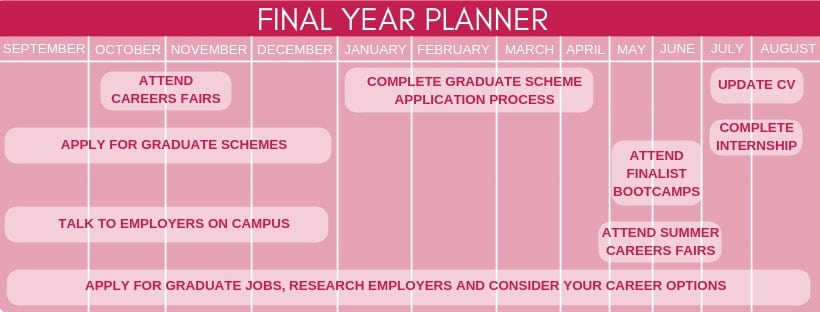As you enter your final year of university, you should not only be focussing on your final exams and your dissertation, but you should also be thinking about life after university.
Are you going to pursue further study? Take a year out? Or perhaps you want to get straight into the world of work and start a graduate scheme.
Whichever you path you choose to take, you should have a plan. We’re going to look at what you should be doing and when, as well as some tips to help you score your dream job.
What should I be doing in my final year of university?
Your final year should not only be about study, but also what you want to do in the future.
We will mainly be focussing on applying to graduate schemes in this article, however, we will be touching upon postgraduate courses too.
If you are hoping to get a place on an insurance graduate scheme, then you will have to think ahead. It is a good idea to get started on applications as soon as possible. Getting your applications out of the way before your final exams and dissertation will help remove unnecessary stress and distractions.
Some graduate employers open applications for graduate training schemes early, such as Willis Towers Watson, so you will need to start checking our jobs board as soon as you get back to university.
That said, a majority of graduate schemes will open between September and December. You should apply to these schemes as early as possible, an actuarial career is a hugely desirable one but is also hugely competitive and many schemes will fill up quickly.
However, it is important to note that the recruitment processes of large and mid-tier firms differ from that of small to medium businesses (SMEs). Unlike the structured recruitment process of graduate schemes usually offered by the larger firms, SMEs tend to recruit as and when they need to, so they do not follow a rigid recruitment cycle.
Applying to graduate schemes
Applications for graduate schemes can be a lengthy process, but don’t be put off. There is lots of information out there so when the time comes to applying you will know what to expect and how to prepare.
The process typically begins with filling out an online application form along with a CV and cover letter. If you are successful at this stage, you will progress to online testing which may involve verbal, numerical and personality tests.
This stage is usually followed by a telephone interview before being invited to an assessment centre. If you are unsure about any stage of the application process, you can read our application advice or visit your university careers centre.
In addition to this, remember to look at the careers website of the company you are applying to as they often include top tips specific to their application process.
Updating your CV
As you reach the end of your university career, a good CV is really important as I tis often the first thing the recruiter sees. It is worthwhile getting a friend, family member or careers adviser to have a look before you submit your CV to a potential employer to make sure it’s just right. You can also take a look at our CV advice.
Applying to postgraduate courses
Alternatively, you may not be ready to leave the world of education just yet and you may want to look at postgraduate courses.
If you wish to continue your education, it is worth seeking advice from your university tutors as well as your careers service about the variety of postgraduate options available to you.
Generally, postgraduate courses don’t have strict application deadlines, but admissions may be on a first come first served basis, so it’s worth making your applications early.
What is happening on campus in my final year?
In October or November, your university careers centre will hold an autumn career fair. This is the ideal chance to meet with employers to discuss graduate opportunities and the recruitment process. You may also want to discuss whether it is an option to defer your place for a year.
Employers will also be on campus at other times in the autumn term, giving you a chance to ask recruiters any questions you may have if you missed them at the career fair. You can use our events calendar or visit your career service to find out when employers are on campus.
If you are considering a postgraduate course then keep an eye out for postgraduate talks and events that are happening around the university. Your careers centre or department may host events on what to do after your Masters or PhD; these are worth looking out for.
Recruiters will also be on campus for campus recruitment events in the autumn term. These could be presentations, skill sessions or attendance at the careers fair.
What happens if I haven’t secured a job before the end of the year?
Don’t panic! That’s the main thing to take away.
Many universities will hold summer career fairs in May or June when you have finished your final exams. These are aimed at finalists who may have not secured a graduate job and will have employers who still have places available.
Similarly, in the last few weeks of term, some universities will run events specifically for finalists such as boot camps, which aim to prepare you for the transition from university to employment.



